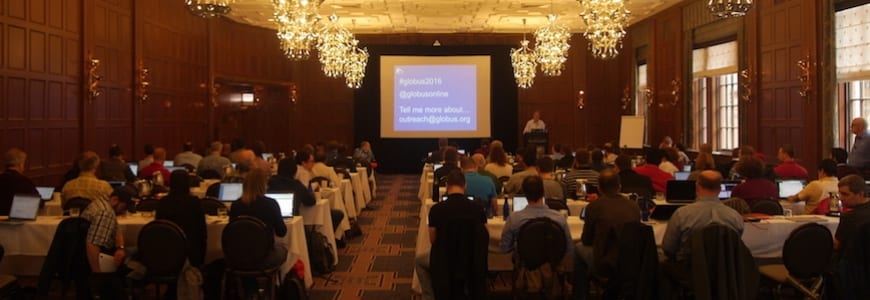By Rob Mitchum // April 27, 2016
Software helps people harness the power of computing for the task of their choice, be it analyzing a genome or streaming a movie. But platforms provide the next level of computational potential, enabling easy access to software for users and a strong foundation for developers to build upon and distribute their work. A good platform example is iOS, the operating system for mobile Apple devices, which through its app store and programming language allows worldwide distribution of software, near instantly, at low cost.
For nearly two decades, Globus software has helped researchers move data and collaborate globally. For the last six, Globus software-as-a-service has expanded those capabilities to include data sharing, publication, and discovery, transferring more than 155 petabytes and counting in the process. But at Globusworld 2016 in Chicago, Globus co-founder and CI director Ian Foster focused on the next evolution for the project, making the leap from scientific software to science platform.
Today, large international scientific collaborations are searching everything from the deep ocean to distant galaxies to subatomic space. Typically, these projects build their own custom computer infrastructure to manage the increasingly massive amounts of data generated by instruments such as telescopes and particle detectors. But Foster said that, despite their different goals, most of these efforts share a great number of computational requirements in common, including data sharing, user authentication, and HPC analysis. Identifying a common platform that can be built upon by current and future Big Science projects will save both time and money, he argued.
There’s precedence in other tech fields, where platforms such as Amazon Web Services and Microsoft Azure have made software cheaper, extensible, and interoperable. They’ve made it easier for developers to tap into cloud computing for the creation of software-as-a-service applications, drawing upon APIs to handle the tedious behind the scenes tasks. A science cyberinfrastructure, if universally accepted, could perform a similar role for stimulating an ecosystem of science applications, Foster said.
Many of these platform capabilities — such as authentication and file transfer APIs — are already provided by Globus, with more services coming soon. Thus, Globus can handle the data and security “heavy lifting” behind the scenes, so that researchers can build their own applications more easily. One example is the Research Data Archive at the National Center for Atmospheric Research (NCAR), which provides easy access to petabytes of data using Globus endpoints behind the scenes.
Other hints of the future were provided by lightning talks over the final two days of Globusworld, with representatives from Compute Canada, Los Alamos National Laboratory, the National Center for Supercomputing Applications, and more talking about data products they’ve built using Globus services. Large research instruments such as the Advanced Photon Source at Argonne National Laboratory and the National Spherical Torus Experiment led b Princeton University, both capable of generating terabytes of data each day — will automatically distribute data via Globus-based pipelines.
But it’s not just the giant research agencies and projects that would benefit from a shared science platform, Foster said. The “95%” of scientists who aren’t involved in Big Science global collaborations still share many of the same computational needs, such as data sharing and discovery, just on a smaller scale. Imagine if managing research were as easy as managing travel through the TripIt app, Foster proposed, with data from your laboratory instruments automatically shared with the scientific community and relevant data from other laboratories as easy to find as a web search.
“I believe we have only just touched the surface of opportunities for computation in science,” Foster said. “There are so many opportunities that have not been exploited because getting access to computing and data is just too difficult.”
We’ll have full video of Ian Foster’s keynote from Globusworld 2016 available soon. You can download his slides here.

